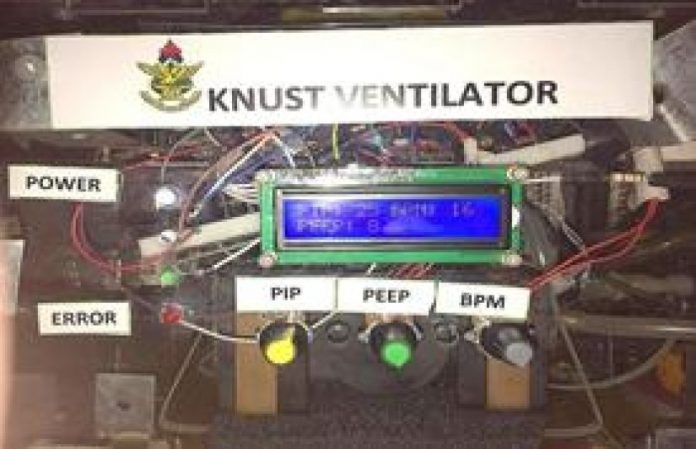
The College of Engineering, Kwame Nkrumah University of Science and Technology (KNUST), has reached the advanced stage in the design and construction of a homemade ventilator.
The project, a joint work between the College’s Computer Engineering Department and Michigan Technological University, United States (US), is expected to boost health service delivery for patients with breathing deficiencies and disorders.
This cooperative effort is headed on the KNUST side by Professor Kwame Osei Boateng with Dr. Yacub Ahmed as the students’ project supervisor.
Prototypes of the project dubbed ‘IBV and KNUST Ventilators’, had been produced – a major breakthrough as Ghana joins the rest of the world to fight the COVID-19 (coronavirus) disease.
Less expensive materials and technology were used in building the prototype portable ventilators.
Next stage of the project is to implement a feedback system to automate start/stop events, depending on signals fed from a patient.
“The results and analysis of the machine performance using the ‘Kruskal Wallis H’ test showed that the H was less than the critical value (H˂11.0705) – which means that the null hypothesis is valid.
This implies that there is no difference between the Peak Inspiratory Pressure (PIP) values, the highest level of pressure applied to the lungs during inhalation, comparing the KNUST Ventilator with those commercially available,” Professor Boateng, the Project Lead, disclosed this in an exclusive interview with the Ghana News Agency (GNA), Kumasi.
The life support equipment was re-engineered by six final year Biomedical Engineering undergraduate students – Akwasi Darkwah Akwaboah, Josephine Owusu-Akyaw, Ayesha Tiwaa Ahmad, Isaac Kumi Koduah, Stephen Kwabena Asante and Afua Boakyewaa Appiah.
Prof. Boateng said the project was executed in two parts by two sub-teams – packaging/mechanical and electrical/programming.
The packaging/mechanical sub-team focused on the design of the final exterior casing and pneumatics (gas flow and tubing), while the electronic/programing dealt with the electronic circuit design, the device operating algorithm construction, microcontroller programming and other electrical/electronics’ needs of the project.
Prof. Boateng said as part of enhancements to the project, the team was considering the use of externals signals from the muscle of the conscious patient as feedback signal to trigger the ventilator into operation “when the need arises and to stop it when no longer needed.”
Prof. Mark Adom-Asamoah, Provost of the KNUST CoE, said that breathing was an essential human function necessary for the sustenance of life and that unfortunately millions who grapple with breathing deficiencies were usually unable to access or afford this care.
This, he said, was due to the expensive nature of the few available ventilators, which were even bulky in nature.
The world is currently facing a critical shortage of mechanical ventilators in the wake of the upsurge in COVID-19 cases, and it is estimated that between 10 and 25 per cent of patients sick with the disease require assistance to breathe.
According to the Johns Hopkins University, roughly five per cent of patients will develop acute respiratory distress, at which point only a mechanical ventilator can drive oxygen intro their lungs and push fluid out.
Prof. Adom-Asamoah was hopeful that after clinical testing the equipment would be produced on a larger scale for the benefit of the country.
Ghana had so far recorded more than 400 confirmed cases of COVID-19 and eight deaths.
GNA

Putting a spotlight on business, inventions, leadership, influencers, women, technology, and lifestyle. We inspire, educate, celebrate success and reward resilience.














